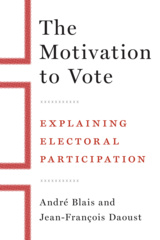
What’s Trending in Canadian Politics?
Understanding Transformations in Power, Media, and the Public Sphere
What trends are shaping contemporary political communication and behaviour in Canada, and where are they heading?
What’s Trending in Canadian Politics? examines the shifting nature of political communication and democratic governance in a digital age. Exploring the effects of conventional and emerging political communication practices in Canada, contributors investigate topics such as the uses of digital media for political communication, grassroots-driven protest, public behaviour prediction, and relationships between members of civil society and the political establishment. This interdisciplinary volume lays robust theoretical and methodological foundations for the study of transformative trends in political communication and in the relationship between political actors, institutions, and democracy.
Original and timely, What’s Trending in Canadian Politics? sheds light on digital innovations while also providing a broader perspective on the online and offline dynamics of contemporary Canadian political engagement.
This book will find an audience among students, scholars, and practitioners of Canadian politics, governance, political communication, media studies, party politics, and political campaigning and elections. Engaged Canadian citizens will also find much to pique their interest.
Observers of democratic politics are struggling to make sense of the rapid changes in political communication; What's Trending in Canadian Politics? offers many helpful insights into what's changing and why it matters.
Scholars are still coming to terms with the transformative effects the internet and social media are having on politics, public policy, social activism, and public discourse in Canada, in part due to a paucity of empirical research. This volume goes a long way in advancing our knowledge of the seismic shifts taking place in political communication.
Mireille Lalancette is a political communication professor at Université du Québec à Trois-Rivières. With Marie-Josée Drolet and Marie-Ève Caty, she is the author of ABC de l’argumentation: Pour les professionnels de la santé et toute autre personne qui souhaite convaincre. She is also a researcher for the Groupe de Recherche en Communication Politique. Her work has appeared in various scientific publications and edited collections in English and in French. Vincent Raynauld is an assistant professor in the Department of Communication Studies at Emerson College, Boston, and an affiliate professor in the Département de lettres et communication sociale at Université du Québec à Trois-Rivières. He is also a research associate in the Groupe de Recherche en Communication Politique. Erin Crandall is an assistant professor in the Department of Politics at Acadia University, Nova Scotia. Her work has appeared in the Canadian Journal of Political Science/Revue canadienne de science politique, Public Policy and Administration, and the Canadian Journal of Women and the Law, among other publications.
Contributors: Shelley Boulianne, Kenneth M. Cosgrove, Mark Daku, Yannick Dufresne, Thierry Giasson, Jacob Groshek, Guillaume Latzko-Toth, J.P. Lewis, Patrick McCurdy, Fenwick McKelvey, Florence Millerand, Jill Piebiak, Thomas Poell, Maxime Pronovost, Kate Puddister, Tamara A. Small, Mickael Temporão, Ghada Touir, Sofia Tourigny-Koné, André Turcotte, and Stéphanie Yates with Myriam Arbour
Introduction: Identifying and Studying Trends in Canadian Politics / Vincent Raynauld, Mireille Lalancette and Erin Crandall
Part 1: Trends in Political Engagement and Democratic Practice
1 Social Uses of the Web by Environmental Activists: A Look at Digital Engagement / Ghada Touir, Florence Millerand, and Guillaume Latzko-Toth
2 Rethinking Digital Activism as it Unfolds: Ambient Political Engagement on Twitter during the 2012 Quebec Student Strike / Vincent Raynauld, Mireille Lalancette, and Sofia Tourigny-Koné
3 Bytes and Bitumen: A Case Study of Mediated Discourse on, and Digital Advocacy for, TransCanada’s Proposed Energy East Pipeline / Patrick McCurdy and Jacob Groshek
4 Transforming the Disengaged: Social Media and Youth in Canada / Shelley Boulianne
5 Trolling Stephen Harper: Internet Memes as Online Activism / Mireille Lalancette, Tamara A. Small, and Maxime Pronovost
6 From Spheres to Trajectories of Publicness: Exploring How the 2010 Toronto G20 Protests Were Communicated through Social Platforms / Thomas Poell
Part 2: Political Actors Trending, Interacting, and Reaching Their Audiences
7 Of Walls and Whispers: The Use of Facebook during the 2012 Quebec Election / Yannick Dufresne, Thierry Giasson, and Mickael Temporão
8 Cabinet Solidarity in an Age of Social Media: A Case Study of Twitter Use by Member of Parliament Carolyn Bennett / J.P. Lewis, Mireille Lalancette, and Vincent Raynauld
9 Does the Difference Compute? Data-Driven Campaigning in Canada / Fenwick McKelvey and Jill Piebiak
10 Beyond Market Intelligence: New Dimensions in Public Opinion Research / André Turcotte
Part 3: Engaging, Consulting, and Framing: Trending Practices in Institutions and the Government
11 Covering the Court: How News Media Frames Social Science Evidence and Supreme Court Decisions on Physician-Assisted Dying / Erin Crandall, Kate Puddister, and Mark Daku
12 The Notion of Social Acceptability: Lay Citizens as a New Political Force / Stéphanie Yates with Myriam Arbour
Conclusion: Unpacking Trending Practices in Canadian Politics / Mireille Lalancette, Erin Crandall, and Vincent Raynauld
Contributors; Index










